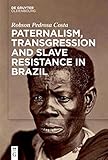Paternalism, Transgression and Slave Resistance in Brazil / Robson Pedrosa Costa.
Material type: TextPublisher: München ; Wien : De Gruyter Oldenbourg, [2022]Copyright date: ©2022Description: 1 online resource (XII, 208 p.)Content type:
TextPublisher: München ; Wien : De Gruyter Oldenbourg, [2022]Copyright date: ©2022Description: 1 online resource (XII, 208 p.)Content type: - 9783110750928
- 9783110751093
- 9783110751079
- 306.362098109033
- online - DeGruyter
- Issued also in print.
| Item type | Current library | Call number | URL | Status | Notes | Barcode | |
|---|---|---|---|---|---|---|---|
 eBook
eBook
|
Biblioteca "Angelicum" Pont. Univ. S.Tommaso d'Aquino Nuvola online | online - DeGruyter (Browse shelf(Opens below)) | Online access | Not for loan (Accesso limitato) | Accesso per gli utenti autorizzati / Access for authorized users | (dgr)9783110751079 |
Frontmatter -- Acknowledgments -- Contents -- List of Tables -- Abbreviations -- Location of the Benedictine Estates of Pernambuco -- Introduction -- 1 Between the “Escape from the World” and the World of Slavery -- 2 Humility, Obedience and Slavery -- 3 Slave-owning slaves -- 4 The Abolitionist Monks -- Sources and Bibliography -- Glossary -- Index
restricted access online access with authorization star
http://purl.org/coar/access_right/c_16ec
Tramps, lazy, cheaters. Expressions like these were widely used by several masters in view of the multiple forms of transgressions committed by slaves. This type of (dis) qualification gained an even stronger contour in properties controlled by religious orders, which tried to impose moralizing measures on the enslaved population. In this book, the reader will come across a peculiar form of management, highly centralized and commanded by one of the most important religious corporations in Brazil: the Order of Saint Benedict. The Institutional Paternalism built by this institution throughout the 18th and 19th centuries was able to stimulate, among the enslaved, the yearning for freedom and autonomy, 'prizes' granted only to those who fit the Benedictines' moral expectation, based on obedience, discipline and punishment. The "incorrigible" should be sold while the "meek" would be rewarded. The monks then became large slaveholders, recognized nationally as great managers. However behind this success, they had to learn to deal with the stubborn resistance of those who refused to peacefully surrender their bodies and minds, resulting in negotiations and concessions that caused disturbances, moments of instability and internal disputes.
Issued also in print.
Mode of access: Internet via World Wide Web.
In English.
Description based on online resource; title from PDF title page (publisher's Web site, viewed 02. Mai 2023)


